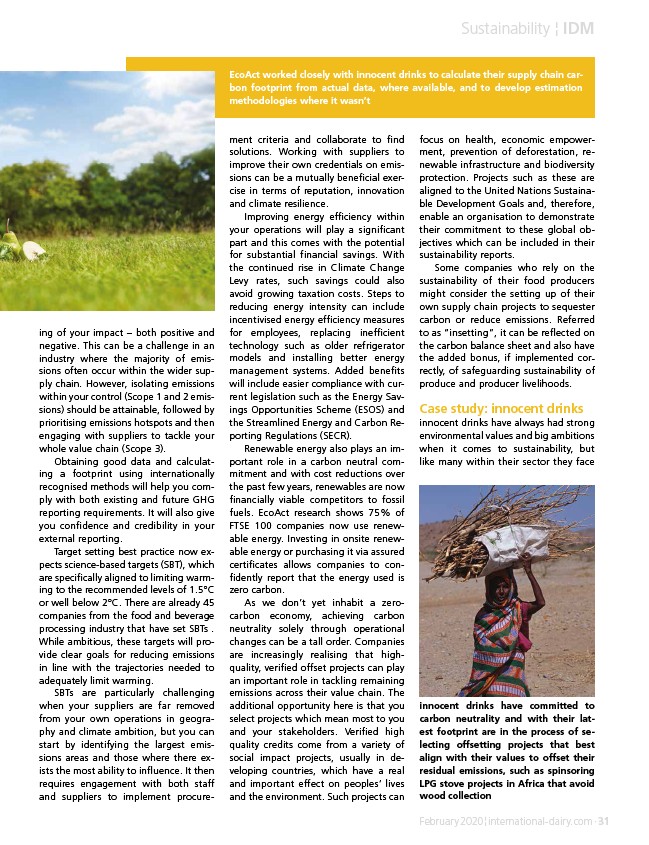
Sustainability ¦ IDM
EcoAct worked closely with innocent drinks to calculate their supply chain carbon
footprint from actual data, where available, and to develop estimation
February 2020 ¦ international-dairy.com · 31
methodologies where it wasn’t
ing of your impact – both positive and
negative. This can be a challenge in an
industry where the majority of emissions
often occur within the wider supply
chain. However, isolating emissions
within your control (Scope 1 and 2 emissions)
should be attainable, followed by
prioritising emissions hotspots and then
engaging with suppliers to tackle your
whole value chain (Scope 3).
Obtaining good data and calculating
a footprint using internationally
recognised methods will help you comply
with both existing and future GHG
reporting requirements. It will also give
you confidence and credibility in your
external reporting.
Target setting best practice now expects
science-based targets (SBT), which
are specifically aligned to limiting warming
to the recommended levels of 1.5°C
or well below 2°C. There are already 45
companies from the food and beverage
processing industry that have set SBTs .
While ambitious, these targets will provide
clear goals for reducing emissions
in line with the trajectories needed to
adequately limit warming.
SBTs are particularly challenging
when your suppliers are far removed
from your own operations in geography
and climate ambition, but you can
start by identifying the largest emissions
areas and those where there exists
the most ability to influence. It then
requires engagement with both staff
and suppliers to implement procurement
criteria and collaborate to find
solutions. Working with suppliers to
improve their own credentials on emissions
can be a mutually beneficial exercise
in terms of reputation, innovation
and climate resilience.
Improving energy efficiency within
your operations will play a significant
part and this comes with the potential
for substantial financial savings. With
the continued rise in Climate Change
Levy rates, such savings could also
avoid growing taxation costs. Steps to
reducing energy intensity can include
incentivised energy efficiency measures
for employees, replacing inefficient
technology such as older refrigerator
models and installing better energy
management systems. Added benefits
will include easier compliance with current
legislation such as the Energy Savings
Opportunities Scheme (ESOS) and
the Streamlined Energy and Carbon Reporting
Regulations (SECR).
Renewable energy also plays an important
role in a carbon neutral commitment
and with cost reductions over
the past few years, renewables are now
financially viable competitors to fossil
fuels. EcoAct research shows 75% of
FTSE 100 companies now use renewable
energy. Investing in onsite renewable
energy or purchasing it via assured
certificates allows companies to confidently
report that the energy used is
zero carbon.
As we don’t yet inhabit a zerocarbon
economy, achieving carbon
neutrality solely through operational
changes can be a tall order. Companies
are increasingly realising that highquality,
verified offset projects can play
an important role in tackling remaining
emissions across their value chain. The
additional opportunity here is that you
select projects which mean most to you
and your stakeholders. Verified high
quality credits come from a variety of
social impact projects, usually in developing
countries, which have a real
and important effect on peoples’ lives
and the environment. Such projects can
focus on health, economic empowerment,
prevention of deforestation, renewable
infrastructure and biodiversity
protection. Projects such as these are
aligned to the United Nations Sustainable
Development Goals and, therefore,
enable an organisation to demonstrate
their commitment to these global objectives
which can be included in their
sustainability reports.
Some companies who rely on the
sustainability of their food producers
might consider the setting up of their
own supply chain projects to sequester
carbon or reduce emissions. Referred
to as “insetting”, it can be reflected on
the carbon balance sheet and also have
the added bonus, if implemented correctly,
of safeguarding sustainability of
produce and producer livelihoods.
Case study: innocent drinks
innocent drinks have always had strong
environmental values and big ambitions
when it comes to sustainability, but
like many within their sector they face
innocent drinks have committed to
carbon neutrality and with their latest
footprint are in the process of selecting
offsetting projects that best
align with their values to offset their
residual emissions, such as spinsoring
LPG stove projects in Africa that avoid
wood collection